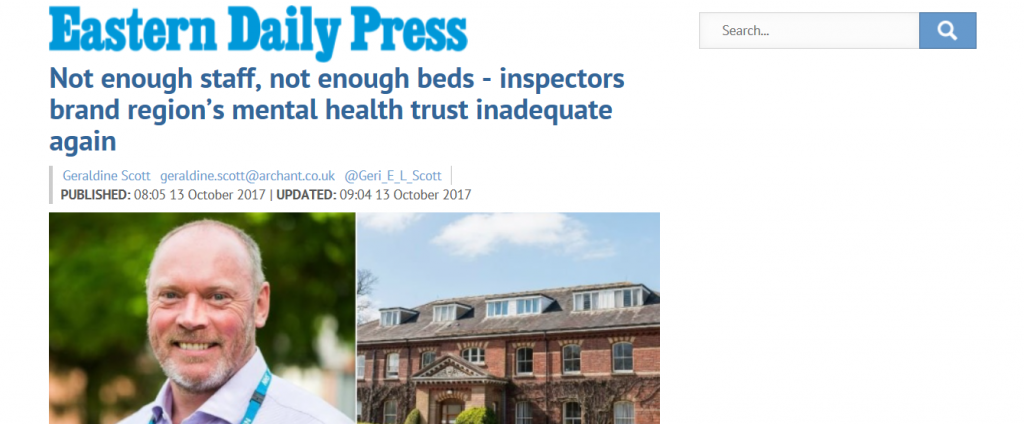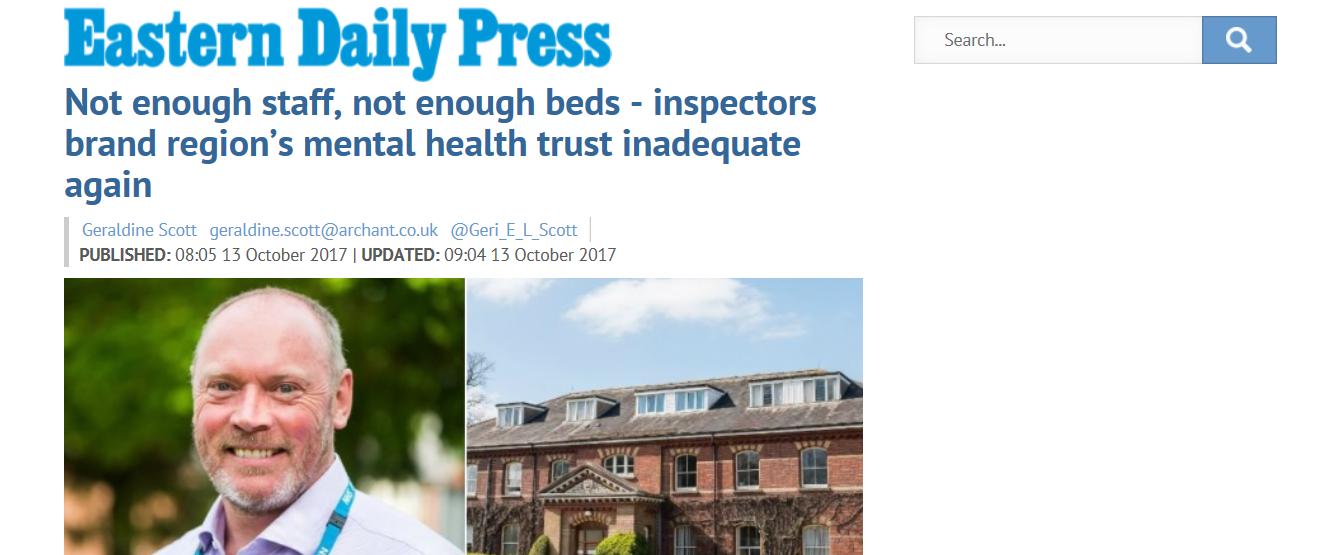Geraldine Scott of the Eastern Daily Press reports:
The region’s mental health trust has once again been branded as failing as inspectors found serious issues first raised three years ago had not been fixed.
Inspectors found patients at Norfolk and Suffolk NHS Foundation Trust (NSFT) were unsafe and the service was inadequately led, as the Care Quality Commission (CQC) rated it as inadequate overall and recommend it be placed in special measures.
In particular, they highlighted how:
- Failings first identified by inspectors in 2014 had still not been addressed;
- Data the board of directors relied on to assess performance was “flawed” and “unreliable”;
- There were not enough staff to meet patients’ needs;
- Unsafe seclusion and restriction practices continued;
- The trust did not have enough inpatient beds – although it maintains it has;
- Community and crisis team referral times were not being met;
- The IT system Lorenzo was having an impact on staff and patient care;
- Staff who work for the trust wanted to provide high-quality care, and were kind and compassionate.
This time around inspectors found more patients were tranquillised, others were kept in unsafe seclusion, and in some instances staff had higher caseloads than levels recommended by the Royal College of Psychiatrists.
In the community, the trust told inspectors there were safe staffing levels but inspectors found this was not always the case. The report said: “In some older people’s teams core staffing levels had not been reviewed by the trust since 2014 despite the concerns of front line staff. Caseloads were an average of 60-70, with an average of 90 referrals a month.”
In crisis services staffing levels had improved but there were still issues. One consultant in Great Yarmouth was responsible for an acute ward, a rehabilitation service, and the crisis team.
The trust also still had “no overarching operating procedure for crisis services” despite this being required after the last inspection. And for those who were not already known to crisis services the “only option in a crisis had been to either telephone 111, wait to see their GP or attend Accident and Emergency departments.”
In 2016, the trust was told it had a beds shortage. But inspectors said: “The trust told us that they did not believe that they had insufficient beds.”
This is a position the trust maintains but this time around the CQC found bed occupancy rates were high, particularly in acute services, “leading to a large number of patients had been treated outside the trust, moved, discharged early or managed within an inappropriate service”.When patients were kept within the trust they were often moved around. Between April last year and July this year, 472 patients had been cared for on more than two separate wards during a single admission.
One patient on Glaven Ward, in Norwich’s Hellesdon Hospital was “transferred between five wards in seven weeks, including out of area, as there had been no psychiatric intensive care beds available”.
Inspectors were also concerned about the monitoring of patients’ physical health after rapid tranquillisation had been used – the number of times the practice had been used had seen a “significant increase” since the last inspection.
When patients were secluded they were sometimes not reviewed by a doctor or nurse, and their food and drink intake was not monitored.
At Northgate Ward, at Wedgwood House in Suffolk, one patient was secluded because they threatened to self-harm, which is contrary to the Mental
Health code of practice requirements.
Inspectors laid much of the blame at the feet of the trust’s board of directors. They said trust chiefs had failed to tackle problems and had not performed quick enough to turn things around. Data collected by the board was contradictory, leading the CQC to conclude any future plans could not be determined.
The trust is expected to be put into special measures in coming days.
The shining light of the CQC report was the caring category, which mainly reflected the attitudes of NSFT staff – it was the only area rated as good.
Almost all patients and relatives told inspectors staff were “kind and supportive” – particularly in older people’s care, community learning disability services, and wards for children and adolescents.
Meanwhile, a spokesman for the Campaign to Save Mental Health Services in Norfolk and Suffolk called the report “devastating and unnecessary but not a surprise”.
He said: “Since 2014, the board of NSFT has chosen to ignore its own patients, carers, staff and regulator. The board of NSFT was warned repeatedly to turn back by our campaign, the Royal College of Psychiatry and Unison. Yet, it chose, and has continued to choose, to ignore us all, and the accumulating evidence of failure, with devastating consequences for patients and their families.”
“Neither the people of Norfolk and Suffolk nor the caring frontline staff can tolerate management failure on this scale any longer.
“Our politicians and the NHS bureaucracy must guarantee that the money and expertise necessary to provide high-quality mental health will be found. NSFT’s budget this year is less than when the trust was formed on January 1, 2012. Given increased demands and inflation, any management – competent or not – would be challenged.
“The increase in seclusion and restrictive practices indicates a trust at breaking point, which puts both staff and patients at risk.
“The claim made by the NSFT Board that it has enough beds is farcical, as shown by the millions wasted at the inadequately-rated hospital at Mundesley. We need investment in a mix of community and inpatients services which keeps as many people as possible alive and well.”
Read the story in full, including the excuses from the NSFT Board and the bleating of the minister for mental health responsible for this mess, Norman Lamb, who only last week was praising the leadership of Michael ‘Payrise’ Scott, by clicking on the image below.
Even better, buy a newspaper and support the local investigative journalism which has been so important in raising the issues at NSFT.

